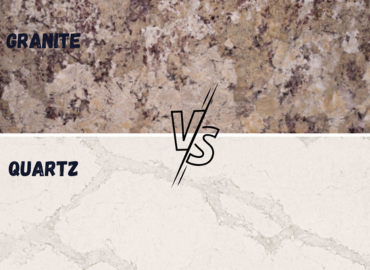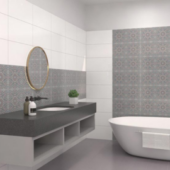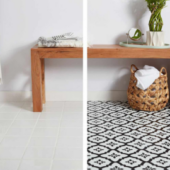When embarking on a new project, especially in areas like kitchen countertops, choosing the right material is crucial. Two popular options are granite and quartz. Understanding the differences between these materials can help you make an informed decision that aligns with your aesthetic preferences, functional needs, and budget.
Composition and Origin
- Granite: A natural stone formed from the cooling and solidification of magma beneath the Earth’s surface. Each slab is unique, featuring a variety of colors and patterns due to the natural mineral composition.
- Quartz: An engineered stone made by combining approximately 90-95% ground natural quartz with resins, polymers, and pigments. This manufacturing process allows for a wide range of colors and patterns, including uniform and consistent designs.
Aesthetic Appeal
- Granite: Offers a natural, one-of-a-kind appearance with intricate patterns and a range of colors. Its uniqueness can add a distinctive character to any space.
- Quartz: Provides a more uniform look, which can be advantageous for achieving a consistent design. The variety of colors and patterns available can mimic natural stones or offer more contemporary aesthetics.
Durability and Maintenance
- Granite: Known for its durability and heat resistance. However, being a porous material, it requires periodic sealing to prevent staining and bacterial growth. Regular maintenance is essential to preserve its appearance and longevity.
- Quartz: Non-porous and highly resistant to stains and bacterial growth.It doesn’t require sealing, making it a low-maintenance option. However, it is less heat resistant compared to granite, so using trivets or hot pads is recommended.
Cost Considerations
The cost of granite and quartz countertops can vary based on factors such as quality, color, and installation complexity. Generally, granite may be more affordable, but high-end options can be more expensive. Quartz tends to have a more consistent price range, often higher than standard granite but comparable to premium granite selections.
Environmental Impact
- Granite: As a natural stone, its extraction and transportation can have a significant environmental footprint. However, it doesn’t involve synthetic materials or resins.
- Quartz: Being an engineered product, it involves the use of resins and polymers, which are derived from non-renewable resources. However, some manufacturers incorporate recycled materials into their products, potentially reducing the environmental impact.
Suitability for Kitchen Countertops
When it comes to kitchen countertops, both granite and quartz are popular choices due to their durability, aesthetic appeal, and functionality. However, each material offers distinct advantages and may suit different needs based on your lifestyle and kitchen requirements. Here’s a deeper dive into the suitability of these materials for your kitchen:
Granite for Kitchen Countertops
- Natural Beauty:
- Granite is prized for its natural, earthy appearance. No two slabs are alike, which means your countertop will be entirely unique.
- It offers a variety of colors and patterns, from subtle and neutral tones to bold, striking designs, making it ideal for traditional and modern kitchens alike.
- Heat Resistance:
- Granite is extremely heat resistant, making it an excellent choice for a kitchen where hot pots and pans are frequently placed on the countertop.
- This feature allows you to work confidently without worrying about damaging the surface.
- Durability:
- Its strength makes it resistant to scratches and chips, which is crucial in a high-traffic kitchen.
- However, care should be taken to avoid hitting it with heavy objects, as edges may chip under significant impact.
- Maintenance Requirements:
- While granite is durable, it is a porous material and requires regular sealing to maintain its resistance to stains and bacterial absorption.
- Spills, especially of acidic substances like wine or citrus juice, should be wiped up quickly to prevent discoloration.
Quartz for Kitchen Countertops
- Customizable Appearance:
- Unlike granite, quartz is an engineered material, which means it offers consistent patterns and colours.
- It can mimic the appearance of natural stone or be customized for a sleek, contemporary look. This versatility makes it suitable for modern kitchens or those seeking uniformity in design.
- Low Maintenance:
- One of the standout features of quartz is its non-porous surface. It doesn’t require sealing, making it a low-maintenance option for busy households.
- It’s highly resistant to staining, which is advantageous in a kitchen prone to food and liquid spills.
- Hygienic Surface:
- Since quartz is non-porous, it doesn’t harbour bacteria, mold, or mildew. This makes it an excellent choice for kitchens where cleanliness is a top priority.
- It’s easy-to-clean surface is perfect for food preparation, as it ensures a sanitary workspace.
- Scratch and Chip Resistance:
- While quartz is incredibly durable, it is slightly more flexible than granite, reducing the likelihood of chips or cracks.
- However, sharp objects can still scratch the surface, so using cutting boards is recommended.
- Heat Sensitivity:
- Unlike granite, quartz is less resistant to high temperatures. Exposure to extreme heat can cause discoloration or warping.
- Always use trivets or heat-resistant pads to protect the surface from hot cookware.
Which Is Better for Your Kitchen?
The decision between granite and quartz for your kitchen countertop ultimately depends on your priorities:
- Choose granite if you:
- Value the natural, unique beauty of stone.
- Want a heat-resistant surface for handling hot pots and pans.
- Are willing to perform regular sealing and maintenance to preserve its look.
- Choose quartz if you:
- Prefer a consistent appearance with customizable design options.
- Need a low-maintenance, stain-resistant surface.
- Prioritize a hygienic, non-porous material for food preparation.
Both materials are excellent choices, and your decision will largely depend on your lifestyle, design preferences, and budget. Combining functionality with aesthetics, either granite or quartz can elevate your kitchen’s appeal and usability.
Conclusion
Choosing between granite and quartz depends on your personal preferences, lifestyle, and budget. Both materials offer unique advantages that can enhance the beauty and functionality of your space. To explore a wide range of options and receive expert guidance, visit Chandan Marbles. With locations on Nagar Road, Kharadi, Marketyard in Pune, and in Silvassa, we are conveniently accessible. Feel free to call us at +91 8888843560 or visit our website at www.chandanmarbles.com to learn more.






